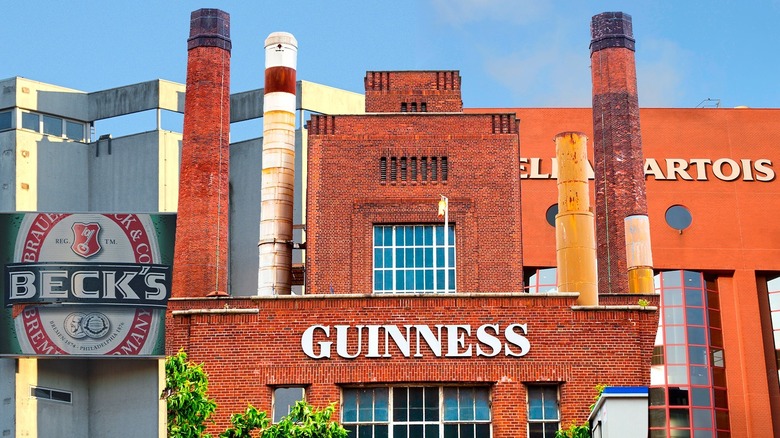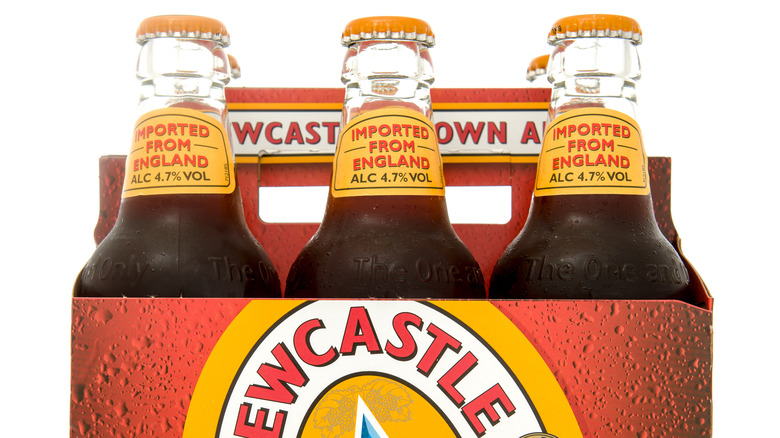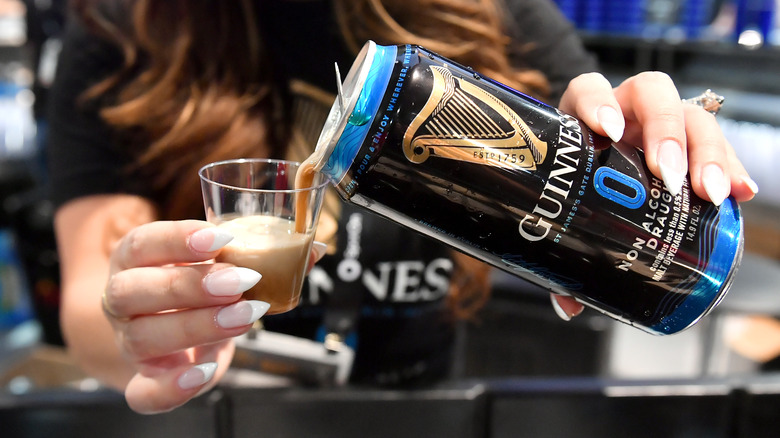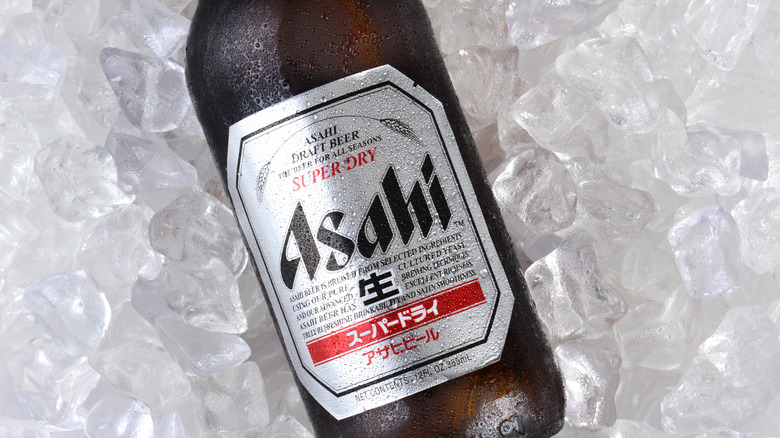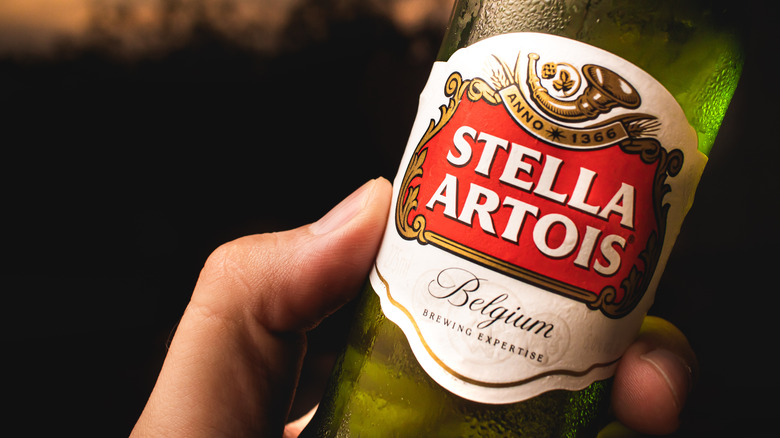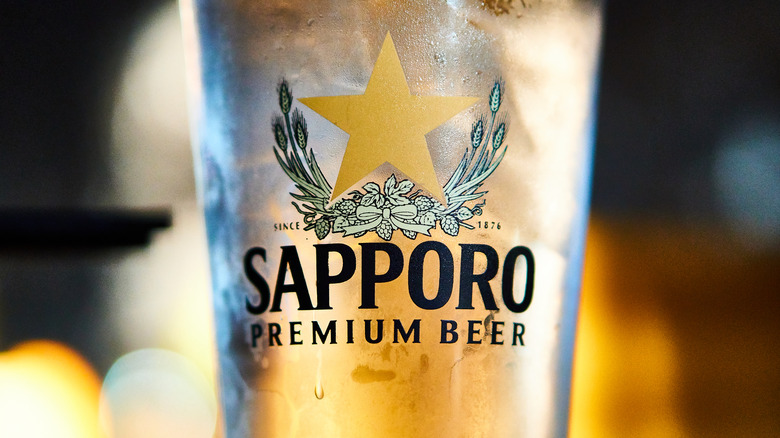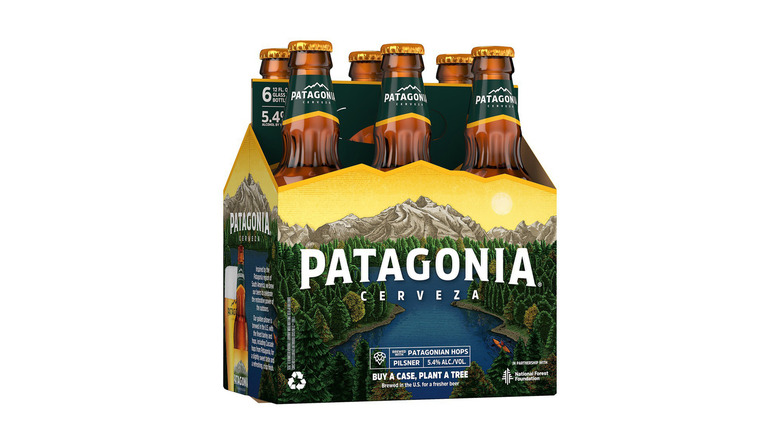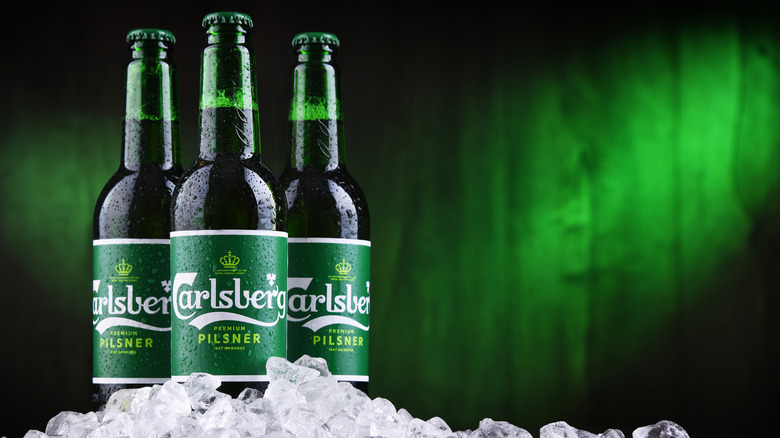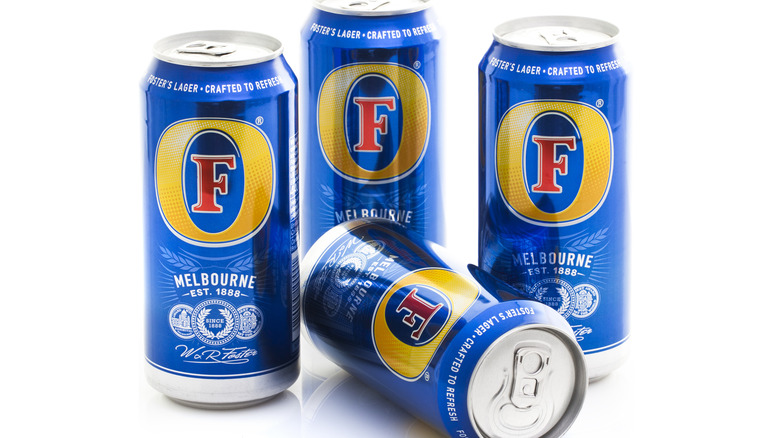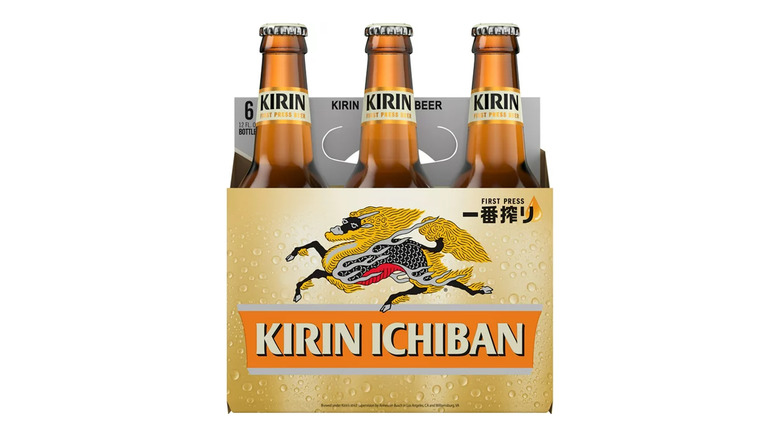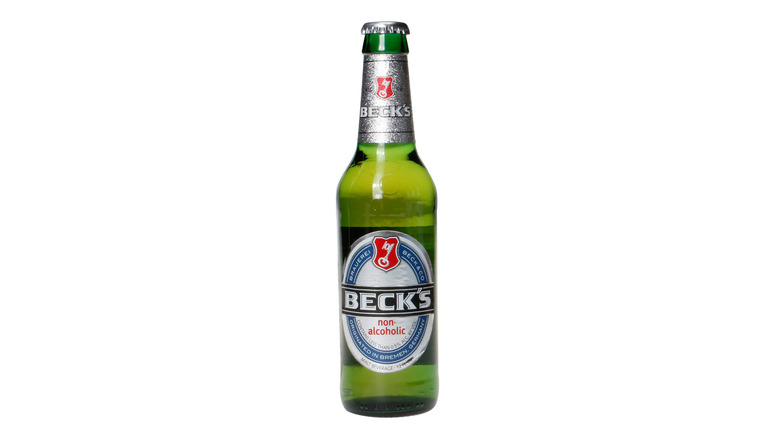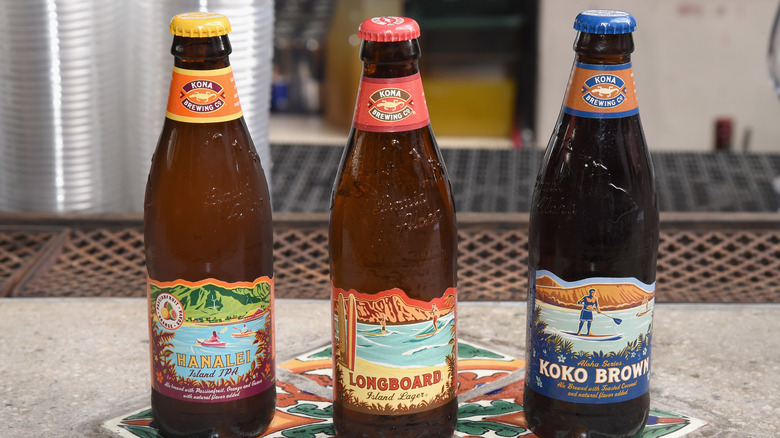12 Beer Brands With Breweries In Unexpected Cities
The heavy and hoppy taste of an Indian pale ale or the roasted maltiness of an American stout, are only two of the delicious and distinct types of brews coming from the wide world of lagers, pilsners, ales, and more. Humankind's love for beer is legendary, in fact, according to the Brewer's Association, the U.S. beer market alone is valued at a jaw-dropping $100 billion.
Imported beers serve as a gateway into international palates. The coffee-like taste of a Guinness might invoke the spirit of a boisterous Irish pub, while Asahi Super Dry Beer's light-bodied hoppiness truly comes to life when paired with Japanese cuisine. Simply put, when we associate a type of beer with a country, certain brew methods and flavors come to mind.
You might be surprised to find that many imported brands aren't actually imported at all. That authentic earthy taste you think comes from Belgium might be brewed right in your backyard. Below we've compiled a list of surprising beer brands with breweries in unexpected cities.
Skol Beer
This light, dry, and crisp-tasting Skol beer finds its origins in Alloa, Central Scotland, where the recipe was concocted at Ind Coope breweries in 1958. Despite the name's obvious Scandinavian roots, Skol has been produced in breweries around the world. At the time, and today to a large degree, beer was mostly brewed in one location before being exported.
Expanding Skol's production to numerous locations was actually genius. By establishing an alliance with breweries around the world, Skol could avoid trade licenses and tariffs, making it easier to license and market as a global product. Now, Skol claims to be one of the world's top five best-selling beers and surprisingly, is largely brewed in Brazil — a far cry from the temperate conditions of its Scottish birthplace. It's also one of the best-selling beers in the South American country, which is impressive considering its technically not Brazilian beer at all.
The Skol taste is sweet and grainy, with hints of apple, corn, and grain. It's a refreshing remedy for hot weather and has a versatile flavor that's easy to pair with nearly any type of savory dish.
Newcastle Brown Ale
Newcastle, England is known for its industrial heritage, distinctive 'Geordie' dialect, and most famously, brown ale. Newcastle Brown Ale is the perfect blend of robust and British flavors and an excellent fall and winter go-to. Originally a blend of strong dark beer and a lighter amber ale, it had a subtle sweetness complemented by a bready body. The recipe changed in 2019 after U.S. production was relocated to Lagunitas Breweries in Chicago and Petaluma, California. Much to the chagrin of fans loyal to "The One and Only" original Newcastle Brown Ale, according to BrewBound, it now includes the brand's signature hops "Centennial and Chinook," making it less sweet while adding bitterness.
Newcastle's decision to partner with Lagunitas in the U.S. came following a decline in sales over several years. Along with a modernized brew recipe, it would feature a new label too. Business hurdles aside, when it comes to taste, as the age-old adage goes, if it ain't broke, don't fix it. Come to find out, Newcastle's recipe had also changed back in 2015 to remove a chemical in the caramel coloring that's used to give it a dark brown hue. Unlike Lagunitas' drastic approach, the change didn't impact flavor.
Guinness
Hailing from the rolling green lands of Ireland is the legendary Guinness, a coffee-adjacent, malty, and sweet beverage of hoppy bitterness. Along with being the country's most popular beer brand, since 1759 its been awarded everything from international acclaim to a distinctive pouring technique that creates a frothy wave of dark ruby-red liquid, the actual color that's commonly mistaken for dark brown. Believe us, to ensure a premium experience, there are four specific pouring steps you need to know about Guinness.
Guinness is in fact no stranger to brewing in other countries having first expanded outside of Ireland in 1936, opening a brewery in London. Now with a global fan base, the brand brews in over 50 countries around the world. The main U.S. hub is called Open Gate Brewery and is located at a historic site that once belonged to a famous distillery named Calvert in Baltimore, Maryland, which happened to be the second-largest brewery in England during the 18th century. You can visit the complex, which also houses a taproom, biergarten, and restaurant, along with guided tours and branded merchandise.
Asahi Super Dry Beer
As a long-time top rated beer in Japan, Asahi Super Dry's light and clean taste is a proven premium experience. Its flavor is rounded out with subtle hoppy bitterness and strokes of toasted malt that comes from a recipe dating back to 1892. Although the famously modern Asahi Brewery opened in 1949, the Japanese rice lager was re-launched in 1985 following a decline in market shares. The brand is said to have conducted a survey with consumers, which convinced Asahi to revisit and recreate the beer's flavor. The subsequent launch of the improved Asahi Super Dry in 1987 would help the brand bubble straight to the top of Japan's beer market — and then the world's.
Following the success, expansion was naturally inevitable, and the rest is pretty much beer history. Asahi's brewing operations today extend far outside of Japan. From Prague to Rome, Italy, and from Los Angeles to Vancouver, B.C., no matter your location, a crisp sip of Asahi is always within reach. Interestingly enough, despite its global footprint, Asahi Super Dry is still associated with Japanese culture.
Stella Artois
Stella Artois is the oldest beer on this list. For many beer drinkers, it's been the lager of choice since way before boozy beverages were commercially sold. Believe it or not, Stella Artois is a Belgium beer with rich heritage starting in 1366. This versatile lager is a mainstay at bars worldwide, bringing a time-tested taste of fruity maltiness, paired with aromatic and bitter hops that leave a dry finish. In other words, it's a crisp beverage that refreshes the palate.
With roots that run that deep, it's not surprising Stella Artois has grown so much, branching out with brewery locations around the world. According to AdAge, as recently as 2021, the brand lost its U.S.-import license, forcing its parent company Anheuser-Busch to move operations to St. Louis. Four breweries located in Los Angeles, Newark, New Jersey, and Jacksonville, Florida were upgraded to help with the volume. Today, the U.S. has become the new base of operations.
Although Stella breweries are widespread, quality is said to be maintained under the watchful eye of Brewmasters from Leuven, Belgium. The Belgian spirit lives on through its signature taste, which can only be truly experienced when you pour Stella the right way.
Sapporo
Whether Sapporo out-crisps Asahi or is more refreshing than Kirin in the taste department is a matter of preference. One thing's for sure though, there's no surprise that all three expanded and are now brewed in locations around the world.
Sapporo is Japan's oldest beer brand. Creator Seibe Nakagawa first began brewing the liquid gold in 1876, following the strict guidelines of Germany brewmasters he learned from while in the country. It's a technique that involves fermenting and aging beer at a low temperature. Sapporo eventually evolved from a barley-based beer into a rice-based beer due to local shortages in German ingredients. It was a natural shift because sake, which Japan had been making for many years, is also made from rice.
Today, Sapporo has brewing operations in countries worldwide. In the States, the classic rice-brewed taste actually comes from facilities in La Crosse, Wisconsin, and Torrance, California. Canadians get their sip from Guelph, Ontario, where it's made by Sleeman Breweries. The beer giant also has a brewery in Long An, Vietnam, ensuring no parts of the globe lie outside its reach.
Patagonia Cerveza
From its packaging design to the fun pronunciation of its name, Patagonia Cerveza evokes a sense of wide-spaced living. It was inspired by Argentina's mountainous landscape and was originally brewed in San Carlos de Bariloche, which is a microbrewery hot-spot due to the region's abundance of a wild yeast H41, named after the town's latitude. The special yeast contributes a stroke of earthy spiciness unique to Argentina, whereas Cerveza Patagonia carries a vibrant splash of biscuits, lemon, and grassy hops. It's refreshing, fruity, and floral.
Looking to reach the American market, it became a member of the Anheuser-Busch family of beers in 2012. According to The Mercury News, the company waited five years before promoting the brand in 2018, starting with a successful trial run in Colorado before expanding distribution to 15 states across the U.S. Cerveza Patagonia can primarily be found in the Pacific Northwest, the Southeast, and a few Rocky Mountain states. Through a partnership with the National Forest Foundation, each purchase of a single case helps to plant a tree somewhere in the world.
Carlsberg Beer
Carlsberg beer comes from the happy city of Copenhagen. It's a legacy beer that was first brewed in 1847 by a man who legend has it, was born specifically to brew. Founder J.C. Jacobsen's sheer passion for the craft would help turn Carlsberg into one of Denmark's most recognizable beer companies. Today, it's called The Carlsberg Group and has a whopping 140 beer brands in its impressive portfolio. Carlsberg's flagship beer is a pilsner — it's golden-colored, aromatic, hoppy, malty, and sweet while leaving a bitter aftertaste. It's definitely an all-around great beer to pair with a wide range of foods and occasions.
Along with its rich and long history, Carlsberg has a long history of overseas brew productions. Their first outside brewery came in 1968, allowing them to expand to Blantyre, Malawi. In fact, through mergers and acquisitions over the years, Carlsberg continued opening and purchasing breweries around the world. This practice continues today and has gone on so long that customers generally associate Carlsberg with Denmark, while unaware it's brewed globally.
Foster's Lager
This lager from down under was immortalized by an iconic TV-commercial run in the '90s that featured the catchy tagline, "Australian for beer." In 1888, Foster's was brewed into existence by two Melbourne, by way of New York, men named William and Ralph Foster. Serving an Aussie population accustomed to British-style ales, which were typically served at cellar temperature (or 55 degrees Fahrenheit), the brothers stood out by offering lighter, smoother, and chilled brews that could combat the country's scorching temperatures.
Facing a similar legal issue as other companies that expanded operations, Men's Journal reported about a New Yorker named Leif Nelson filing a class action lawsuit against the Aussie brand in 2017, claiming he was misled into believing that Foster's was brewed in Australia. Hmm ... wonder where he might've gotten that silly idea? As it turns out, Foster's has been brewed in Fort Worth, Texas, since 2011 when it was purchased by the international SABMiller group, which is housed under Molson Coors Beverage Company, a multi-national merger between Canada's Molson and U.S. Coors companies.
Kirin Ichiban
Several qualities can be highlighted about Kirin Ichiban, along with its thirst-defeating taste of medium-light, mildly bitter dryness. The flavor is further balanced by accents of baked bread, fresh flowers, and grassy hops. As one of the country's most popular beer brands, like Sapporo and Asahi, Kirin Ichiban is synonymous with Japan, serving as a refreshing compliment to daily lives since the brewery was established way back in 1907.
Since 1996, Anhesuer-Busch has run Kirin Ichiban's stateside brewing and distribution from its Los Angeles location. The partnership expanded in 2006, when the beverage juggernaut assumed complete control over the brand's American moves, delivering it to its network of 600 independent wholesalers. That basically means you'll have no trouble finding it.
According to Beverage Daily, in 2013, Anhesuer-Busch came under scrutiny after a complaint was filed alleging that Kirin had deceptive packaging, advertising, and marketing. Kirin Ichiban's parent company denied the allegations, stating that the beer is brewed under strict supervision. The case was settled amicably, possibly implying that the branding was more a point of contention than the actual taste. Thankfully, the Kirin Ichiban and Anhesuer-Busch partnership still delivers the classic taste that made the beer popular in the first place. Whether you consider a Japanese beer that wasn't brewed in Japan as still "authentic," well ... perhaps a better question might be, "Does it taste good or not?"
Beck's Brewery
Founded in 1873 in Bremen, Germany at a brewery aptly named Beck's, this hoppy-scented pilsner is a time-tested beverage of tastiness. Its flavor profile is full-bodied, consisting of slightly fruity notes that leave a crisp and dry finish. In fact, it's made by something called the Reinheitsgebot, an old German "purity" law that requires brewing to specific standards, no matter where it's brewed, and is a commonly used method for many beer-makers.
According to NPR, after landing in the hands of several international brewers, Beck's was eventually purchased by Anheuser-Busch in 2002 and, following the purchase, operations began expanding to the states. Controversy arose when customers complained about the higher costs, according to the report, and, at the time, the new American-made Beck's was still being marketed as a German import. It resulted in a lawsuit that granted the plaintiffs partial refunds of 50 cents per pack, up to $50, says NPR.
Despite its apparent dual citizenship, Beck's remains one of Germany's most popular beer options and a common choice in the States thanks to its St. Louis-based brewery. While the additional import cost was an understandable point of contention, at least the flavor doesn't break any German beer laws.
Kona Brewing
Younger than many other beer brands on this list, Kona Longboard Lager has only been around since 1994. The father-and-son-owned business set out to capture the taste of Hawaii's local craft beer scene and succeeded in accomplishing that and so much more. In the short time Kona Brewing has been around, it's become a popular option for brew lovers around the world.
The line-up focuses mostly on ales and lagers, otherwise humorously dubbed "Liquid Aloha," and each offers a refreshing experience. For example, the Longboard Island Lager is fermented for weeks at chilly temperatures, giving it a smooth, subtly spicy hop with a malty roundness. That's only one of six signature quality flavors.
Although the beer is still brewed in Kailua-Kona on Hawaii's big island, Kona Brewing is also produced and manufactured at its Columbus, Ohio location. You'll have no problem finding this island-inspired brew, as it's widely available at most retailers that sell alcohol.
